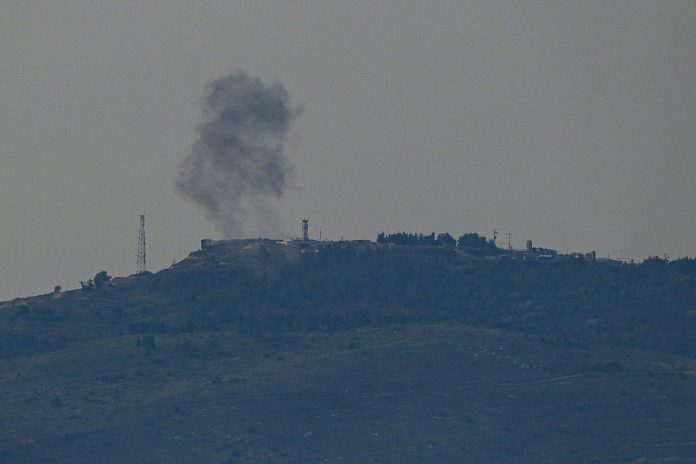
Izz ad-Din al-Qassam, the “military wing” of Hamas, fired 40 Grad rockets in two barrages at army bases near Kiryat Shmona on Wednesday morning.
Only 10 crossed the border and several were intercepted, according to the Israel Defense Forces.
A building in Kiryat Shmona was hit, causing damage but no injuries according to police.
Police said they were dealing with rocket debris at several sites in the Kiryat Shmona area.
“Property was damaged and there are no reports of casualties at this stage,” they said.
In response, the IDF said that it was striking the sources of the launches.
While Hezbollah controls Southern Lebanon, Palestinian terror factions, including Hamas, are active in the region. Israel holds the Lebanese government responsible for all hostilities directed against it from Lebanese territory. Hezbollah joined the war in support of Hamas a day after the Oct. 7 terrorist attack and has been conducting daily cross-border attacks since then.
Additionally, the military announced that early on Wednesday, fighter jets struck a Hezbollah weapons storage facility and military structures in the area of Ramyeh in Southen Lebanon.
A Hezbollah weapons manufacturing site in the area of Khirbet Selm was also hit overnight Tuesday, according to the IDF.
The Iranian proxy fired dozens of rockets at the Upper Galilee on Tuesday in the second round of retaliatory attacks claimed by the terror group following IAF strikes in the Beqaa Valley on Monday.
According to Hezbollah, the barrage targeted the Israeli Air Force’s air control base on Mount Meron, which has been attacked several times since Hezbollah joined the war.
The IDF later in the morning confirmed that 35 launches were identified targeting the Mount Meron area, causing no injuries or damage to the Meron base.
The rockets set off air-raid sirens in Upper Galilee communities.
Following the rocket attack, IAF fighter jets struck several areas in Southern Lebanon, including the areas of Hanniyeh, Jibchit, Baisariyeh and Mansouri, according to the military. IDF artillery also hit targets in the Yaroun area “in order to remove a threat.”
Hezbollah continued to fire rockets and anti-tank missiles towards northern Israel throughout the day on Tuesday, bringing the total number of launches since Monday to 100.
In addition, air-raid alarms on Tuesday afternoon warned of a “suspicious aerial target” that penetrated the skies above the Upper Galilee. An enemy drone was subsequently intercepted by the Israeli military, Ynet reported.
On Monday evening, Hezbollah fired a volley of 60 rockets at the Golan Heights.
On Monday night, the IDF said that fighter jets struck the source of the fire, hitting a launch site in the area of the village of Kawkaba in Southern Lebanon. The IDF also reported that fighter jets struck Hezbollah military compounds in the area of Ayta ash Shab. Earlier in the day, an IDF tank struck an additional Hezbollah military compound in Kfarkela.
Also earlier on Monday, fighter jets struck sites used by Hezbollah’s air defense array in the Beqaa Valley “in response to the launch of surface-to-air missiles towards an unmanned aerial vehicle of the Hermes 450 type, that fell earlier today,” according to the IDF spokesperson.
Hezbollah said that two of its members were killed in the Israeli strike.
The strikes were the deepest attack carried out by the IDF in Lebanese territory since the beginning of the war.
According to the military, the David’s Sling medium-range air defense system intercepted a surface-to-air missile fired at the drone, which triggered air-raid sirens in the area of Alon Tavor in the Jezreel Valley region of northern Israel. However, a second enemy missile was then launched at the drone, downing it.
Separately, the IDF on Monday killed a senior Hezbollah commander in a strike on a car in the town of Mjadel in Southern Lebanon.
The IDF identified the terror operative targeted in the strike as Hassan Hossein Salami, the head of Hezbollah’s eastern command.
“Salami belongs to the Nasr unit of the Hezbollah terrorist organization and commanded recent terrorist activities against IDF forces and civilian and military targets in the north of the country,” tweeted IDF Spokesman Rear Adm. Daniel Hagari.














